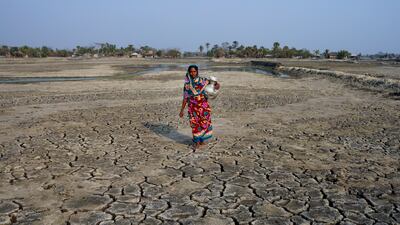Non-economic losses brought on by the effects of climate change must become a more central part of global plans to tackle the problem, a panel of experts said.
The economic losses from extreme climate events are a mounting burden for governments worldwide, however they are generally only limited to quantifiable damage, such as to property, infrastructure, tourism and agricultural production.
Greater emphasis should be placed on the intangible and non-tradable losses to people and society, as well as the environment, a panel of specialists in the field said at an event hosted by London Climate Week on Thursday.
Sandeep Chamling Rai, a senior advisor on climate adaptation at WWF International, told the conference that it was time to shift the spotlight when discussing environmental policies.
“We’re talking about loss of life, health, human mobility, the loss of cultural heritage and of course the damage to biodiversity and ecosystem services”, he said.
“They’re not easy to quantify but they’re very important and should be factored into any solutions".
The UN estimates that climate change could drive an additional 100 million people into poverty by 2030. Extreme weather events, including drought, desertification and rising sea-level already cause more than 20 million people to leave their homes each year.
Practical Action Bangladesh
In March this year the United Nations established its first expert group on non-economic losses in a bid to raise awareness and collect available data on the issue. The environmental arm of the UN also warned that developing countries were facing adaptation costs of of up to $500 billion annually by 2050.
Adaptation is the reduction of communities' vulnerability to climate change through the increase in their ability to absorb the impacts.
Nature-based solutions - the use of the natural world to mitigate effects of climate change – have become increasingly popular and will be at the forefront of the Cop26 climate summit in Glasgow in November.
The term also encompasses broad land use policies. In the UK, these are mainly concentrated on reforestation, new woodland planting and sustainable agriculture.
However, the panellists warned there is a risk that vulnerable and important segments of society may miss out on the benefits of any climate reversal plans if non-economic losses aren’t adequately factored in. These include the loss of cultural heritage sites as well as important knowledge and understanding of local ecosystems.
In Bangladesh, a country highly vulnerable to the effects of climate change, locals who only a few years ago were cultivating and living off their own fruit and vegetables have now been forced off their land, drastically changing their way of living, said Afsari Begum of Practical Action Bangladesh.
“While it is hard to quantify the non-economic losses I can assure you that they are just as important as the economic losses,” said Ms Begum, who works with coastal communities in Bangladesh. “We need to pay the people who are already paying a high price.”
The issue of non-economic losses (NEL) is also relevant in the context of claiming damages and insurance.
“We need to look at NEL from a responsibility point of view and not just a liability and insurance point of view because it isn’t enough to just look at it that way,” said Mr Rai.


